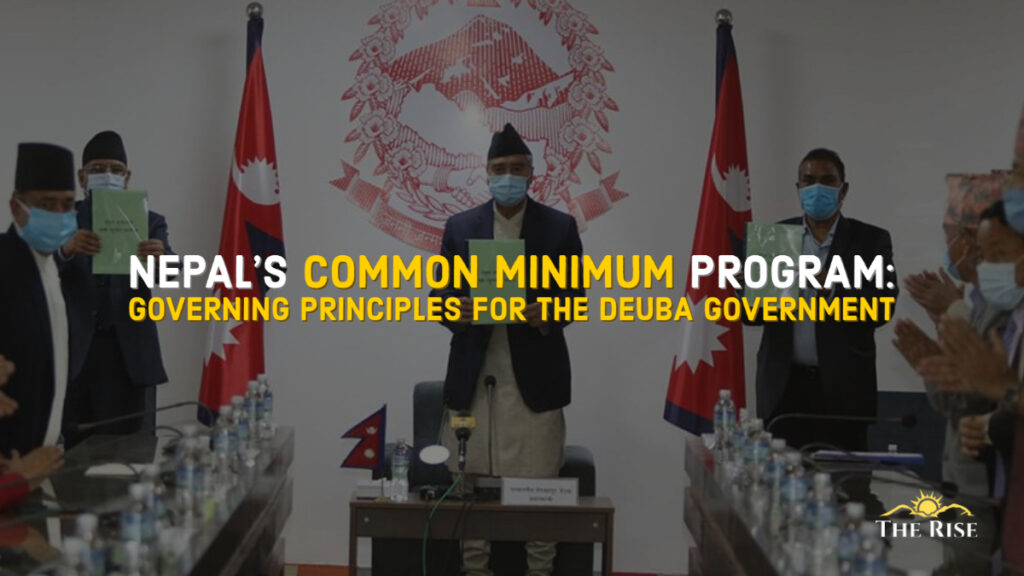A newly formed coalition government led by Sher Bahadur Deuba issued a common minimum program based on unanimous political principles to govern the State of Nepal. Its objective is to ease the government business and public affairs towards performance. While Deuba Government prepared this unanimous position on governance and politics, the Oli Government had, rather, outlined annual policy, program, and budget. A seven-member working group comprising members from Nepali Congress, Nepal Communist Party (Maoist-Center), and Janata Samajwadi Party was proactive. This program included working procedures and ministers’ code of conduct. There were no major outstanding differences in the draft version of the document. Underlining the government priorities and policies, leaders called for consolidating polity and protecting the federal democratic republic from regression. The document states that complete immunization of Nepalese will be accomplished in 2022 to curb the COVID-19 third wave, raise its awareness, create physical infrastructure and develop vaccines in Nepal. There was an unequivocal stance of the newly formed political coalition to restrain from following the extra-constitutional methods of the Oli Government and appointment of authoritarian individuals in the constitutional agencies of Nepal. Let’s look into Nepal’s common minimum program.
Government’s Modus Operandi
The ten points on the modus operandi to be followed by the newly formed government include:
- Coalition government to be responsible and accountable to Nepal and Federal Parliament with appropriate working modality to function and operate.
- It will be accomplished on the basis of the Government’s common minimum program.
- Ministers are personally responsible to the Ministry and collectively to the Prime Minister and Federal Parliament.
- The Council of Ministers must abide by the Code of Conduct.
- If found guilty of abetting corruption, irregularities, and indiscipline, they are relieved from their ministerial duties.
- Citizens’ complaints and grievances related to government activities are resolved immediately by the concerned ministries.
- Ministry of Foreign Affairs will coordinate when the members of the Council of Ministers meet diplomatic mission representatives and abroad visits.
- Ministers should follow the rule of law when exercising authority and using Government means & resources.
- Ministers and subordinate agencies must prohibit trends of nepotism, favouritism, prejudice, and discrimination in their business or affairs.
- Mutual consultations and consensus should be followed among aligned parties of the coalition Government in matters of national importance and long-term repercussions.
Also Read: End of Oli Era: A New Start for Indo-Nepal Relations
Code of Conduct for the Council of Ministers
A fourteen-point code of conduct on the probity of the Council of Ministers has been laid down to proactively accomplish core responsibilities of transforming the socio-economic situation and consolidating the federal democratic republic. The code of conduct delineates the following points:
- To make Ministers responsible to the country and people when commencing or performing business allocations with the highest sincerity while being accountable to the Prime Minister and Federal Parliament.
- To abide by the common minimum program to execute duties in a non-discriminatory manner and proactive approach.
- Declare personal assets when entering or leaving the higher offices.
- Follow directives of the Government and support the Prime Minister.
- To maintain the prestige of position while performing responsibility in accordance with the rule of law.
- Honestly complete governmental responsibility with clean conduct and highest ethics without fear or favour.
- Abuse of power and position or any inappropriate and illicit privilege should not be exercised.
- To abide by discipline and protocol while maintaining the secrecy of the Council of Ministers.
- When discharging the responsibility of the office, the self-interest should not incite illicit and corruption-prone activities.
- To be economical by a commitment to simple living and stringent perseverance.
- They are forbidden to indulge in activities against national and people’s interests.
- Official esteem, prestige, and responsibility should not be endangered when building rapport or relations with anyone.
- Nominating and making appointments on official positions in an impartial, free, and inclusive manner.
- If the code of conduct is breached Prime Minister will relieve officials from the post. For this purpose, Prime Minister will consult concerned political parties as per need.
Also Read: Deuba’s Foreign Policy Amid Fluidity: Continuity or Change?
Government Priority
An eleven-point program prioritizes the government activities as follows:
- To manage pandemic-related humanitarian crises during COVID 19 surges.
- To ensure constitutional supremacy, the rule of law, and good governance.
- To implement peace process completely as per detailed peace agreement and forge consensus with different parties.
- To take initiatives to amend the constitution based on consensus among political parties.
- To implement federalism, enabling of provincial and local level governments and to present pending laws to the parliament.
- To emphasize higher economic development on the basis of promoting socio-economic transformations.
- To underline economy through manufacturing sectors, logistics and supply reforms, price hike control, investigate and take punitive measures against corruption.
- To provision special economic package to industries, tourism, communication, transportation, party palaces, cinema, and entertainment industries impacted by COVID -19 and take relief measures for workers, disadvantaged and unemployed groups.
- To emphasize rescue, relief and reconstruction of disaster-affected areas.
- To follow a foreign policy based on national interests of people’s prosperity.
- To consolidate national integrity by fostering a culture of mutual dialogue, consensus, and coalition.
Also Read: India-Nepal Relations: A Way Forward for Strong Relations
Note Finale
The government’s functional operations are outlined to complement the Business Allocations of the Government of Nepal Regulations 2007 (2064 Vikram Samvat). This is a consensus to bring normalcy and coherence in the government’s performance and functioning. This would help the government in stabilizing its mechanism of working. Similarly, to run the government, a code of conduct or ethics has been spelled out to discharge entrusted government responsibility, duty, and accountability in the highest order of personal and national integrity. In this framework and the informal rules, government priorities are mentioned publicly to maintain law & order and human security in times of emergency and uncommon situations.
Disclaimer: The views expressed in this article are of the author solely. TheRise.co.in neither endorses nor is responsible for them.
About the author
Mr. Kunwar is a politics and international relations analyst based in Kathmandu.
































Pingback: Nepal: Politics of American Initiative of MCC - TheRise.co.in